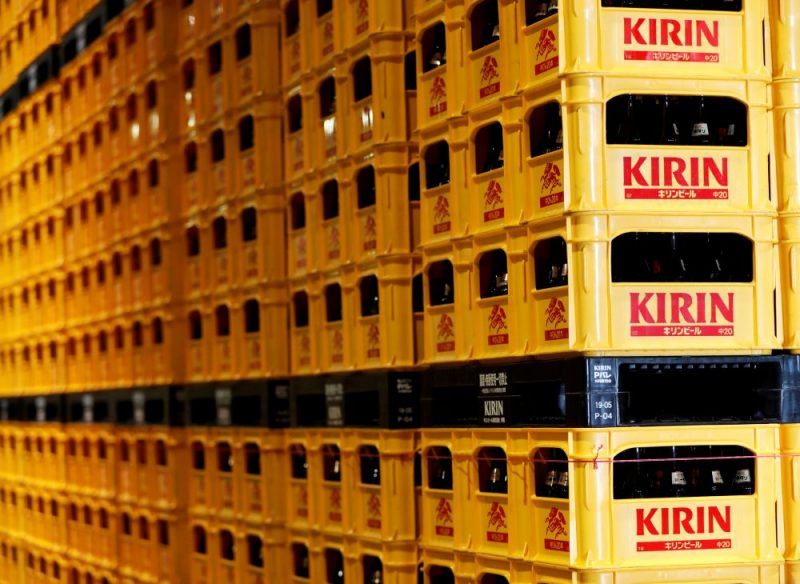Japan beer giant Kirin has become the latest foreign company to announce it is leaving Myanmar in the wake of a coup last year and a military crackdown on dissent.
Investors flocked to the country after the military relaxed its iron grip in 2011, paving the way for democratic reforms and economic liberalisation in the country of more than 50 million people.
But human rights groups have pressed foreign companies to rethink their activities in Myanmar following the February 2021 coup and a subsequent crackdown which, according to local monitoring groups, has left more than 1,500 people dead.
The US government last month warned companies worldwide that doing business with Yangon ran “the risk of engaging in conduct that may expose them to significant reputational, financial, and legal risks.”
Investors and traders were warned specifically to avoid state-owned enterprises, the gems and precious metals sector, real estate and construction projects, and the arms business.
Pulling Up Sticks
Energy giants TotalEnergies and Chevron said last month they would leave their partnership with a military-backed firm operating a gas field in the Andaman Sea following pressure from human rights groups.
Human Rights Watch says natural gas projects are Myanmar’s single largest source of foreign currency revenue, generating more than $1 billion every year.
TotalEnergies paid more than $400 million in total to Myanmar authorities in 2019 and 2020 in the form of taxes and “production rights”.
Australian energy firm Woodside followed soon after, blaming “the deteriorating human rights situation” as part of the reason for the move, which will cost the company at least US$200 million.
Woodside operates multiple exploration and drilling sites in Myanmar.
Earlier this month Taiwan shipping giant Evergreen Marine told AFP it would no longer dock its ships at a military-owned port terminal in commercial hub Yangon.
It did not give a reason or clarify whether it would still send vessels to other ports in the country, but the move was welcomed by rights groups.
British American Tobacco, which supported more than 100,000 jobs in Myanmar before the coup, pulled up sticks in October. French renewable energy firm Voltalia has also left.
Kirin’s Monday announcement comes after months of wrangling following the coup, prompting the company to express concerns about human rights and eventually seek to end its joint venture Myanmar Brewery Ltd.
Myanmar Brewery, whose beverages include its flagship and ubiquitous Myanmar Beer brand, boasted a market share of nearly 80%, according to figures published by Kirin in 2018. Its beer has been widely boycotted since the coup.
Suspending Operations
Japanese carmaker Toyota was due to launch manufacturing at a Myanmar factory last year but put the project on hold.
Myanmar factories became suppliers of many popular clothing brands over the past decade, but groups such as Italy’s Benetton stopped placing new orders after the coup.
French energy giant EDF has suspended its involvement in a $1.5-billion project to build a hydroelectric dam, Shweli-3, alongside consortium partners Marubeni of Japan and Ayeyar Hinthar of Myanmar.
Shortly after the military takeover, Japan’s Suzuki suspended production at its two Myanmar factories but then quickly reopened the facilities, which assemble vehicles for the local market.
French hotel group Accor, which has nine hotels in Myanmar, said on Friday that it had “made the choice to stay in the country for now and maintain support” for its 1,000 employees on site and for the communities near the group’s hotels.
Denmark’s Carlsberg, which employs around 450 people in Myanmar, has said it has reduced output as consumption has declined, but has not announced any plans to leave.
Last year Norway’s Telenor announced it planned to sell its subsidiary Telenor Myanmar, later citing junta demands that it install monitoring equipment on the network as a reason for leaving the country.
- AFP, with additional editing by George Russell
READ MORE:
Taiwan’s Evergreen Halts Use of Myanmar Junta-Linked Port
Myanmar Strife Keeping Rare Earth Prices On The Boil
TotalEnergies, Chevron Myanmar Exit Won’t Hurt Junta: Analysts
























